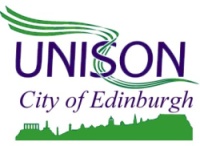
UNISON deputation to Edinburgh Council Finance and Resources Committee on Thursday 08/02/18, led by branch secretary Tom Connolly.
Impact of Austerity in Scotland
The budget allocation from the Scottish Government to Local Authorities in December 2017 saw a revenue cut of £225m – this has been partly mitigated by changes to Council Tax bands and the ability to raise the Council Tax by 3% – but still leaves a shortfall of at least £55m.
Between 2010-11 and 2017-18 funding for local government has fallen 8% in real terms – funding for core services has reduced by £590m.
Some 30,000 council jobs have gone in this period – nine out of ten jobs lost across the public sector in Scotland have been in Local Authorities.
Councils have responded to austerity by a combination of increased local taxation, increased regressive service charges (up by 13%), and workforce and service cuts.
They also have attempted outsourcing of services as the then Lib-Dem/SNP coalition in Edinburgh attempted a few years ago – fortunately our successful ‘Our City’s not for Sale’ campaign stopped big private companies like Carillion/Capita taking over important council services.
Situation in Edinburgh:
City of Edinburgh Council Budget Cuts 2018-19
We have already lost £250million from the budget over the past five years and with another potential cut of £150 million pound over the coming five years we really are witnessing the silent slaughter of local government.
The City of Edinburgh UNISON branch is the largest public service Union, with members across all departmental and service areas within the City of Edinburgh.
We have always led the way challenging the austerity agenda and the impact that this has and is having on our members employed by the council.
Our people provide the services to the most vulnerable and disadvantaged peoples in the most deprived areas of Edinburgh.
UNISON led the successful ‘our city’s not for sale’ campaign, and prevented the then council administrations, and the then chief executives desire to outsource a massive proportion of our jobs and services.
We built great partnerships with community organisations and residents through the campaign and these links are still there.
Our links with our sister trade unions are strong. We are united in our position of opposition to the cuts.
UNISON representatives have made and will continue to make deputations to many council committees including full council meetings highlighting the risks associated with cuts. Unfortunately, these tend to fall on deaf ears and show a complete disregard for the staff employed in their authority.
You have a statutory Duty of Care to your staff and you need to remember this.
I have heard elected members say ‘our hands are tied’; this week we celebrate the 100-year anniversary of Women being given the right to vote. Those brave women and some men had the whole system of the law and the establishment against them, imprisoned, force fed, demonised, but victories in their aims. That’s a real example of people’s hands being tied – no one in here has their hands tied, just a lack of principle when it comes to defying injustice.
With 7000 hours of unmet need in Health and social care and around 1800 outstanding assessments, we welcome the extra monies being given to assist with the assessments, will this only result in more unmet need?
At a previous F and R committee held on the 7 November 2017 a conservative councillor asked what an unmet need was? shocking in itself, but when he was informed he replied something to the effect ‘so you are looking for a blank check’ this shows the ideological loathing that the conservatives have towards public services and the most vulnerable and needy in our society.
UNISON applauds the Conservative and Lib/Dem councillors who supported and fought for the maintaining of the music school – UNISON City of Edinburgh would like to see all communities in our City having access to music schools.
We have grave concerns that the same councillors will have a lot less interest in the potential cuts in other service areas, including early years and health and social care.
Of even greater concern was the conservative leader’s comments at the Finance and Resources committee held the 27 November 2017 where he was implying how stretched the top 10% already are.
Perhaps he could have a word with his other colleagues in the conservative party, not those just in the top 10%, but those in the top 1%, such as the likes of Lord Ashcroft and ask them if they would start paying their income tax instead of hiding their massive fortunes in tax havens.
These are the same people who tell us that they are over taxed, while at the same time they tell us that their Austerity agenda is needed to get the public finances into shape.
He may also want to put pressure on the Prime Minister and the Chancellor of the Exchequer and encourage them to move away from Austerity and invest in the country’s infrastructure and public services.
The SNP group need to put pressure on the Scottish Government, and the Cabinet Secretary for Finance and Constitution, to move away from their historical position of applying huge cuts to local government.
UNSON city of Edinburgh demands that the progressive parties on the council are seen to be standing up for and fighting to protect jobs and services, not being mere administrators of austerity.
UNISON demands that the council as an employer, takes its statutory duty of care to its employees more seriously, your staff are demoralised, and being asked to take on more and more with less and less, resulting in detrimental impacts to their health and wellbeing.
If shaped by austerity Transformation programs do not work, they cannot work. Transformation in this context is no more than cost cutting, reducing services, and have a negative impact on the terms and conditions of the staff who provide them.
Pay
The trade unions are clear that this year’s pay settlement must protect workers from the sharp rise in inflation (the Office for Budget Responsibility (OBR) forecasting rating percentage index RPI inflation this year of 3.3. %), start to reverse the many years of real terms cuts to wages through pay restoration, and protect the lowest paid.
Trade unions have asked for a £1,500 flat rate increase to all, or 6.5%, whichever is greater. This is based on an above inflation increase plus an element of restoration.
The detailed points of the pay claim are:
A settlement that runs for the period 1 April 2018 to 31 March 2019.
A £1,500 flat rate increase to all spinal column points, or 6.5%, whichever is greater (based on a 37hour working week). This includes an above inflation increase plus an element of restoration and should be applied after the Scottish Local Government Living Wage increase has taken effect.
An equivalent percentage uprating of the Scottish Local Government Living Wage (SLGLW), with the SLGLW being used as the minimum pay level for pay and all allowances.
An equivalent percentage or, the median paid where the base salary increase is paid as a flat rate, uprating of all allowances.
A commitment to redress the imbalance in pay, caused by previous pay awards which have been below the rate of inflation, over a period of not more than 5 years.
Our local government workers members have suffered a real terms loss in pay over the past ten years of some 15%. It is only right therefore that this year’s pay settlement must protect workers from the sharp rise in inflation, start to reverse the many years of real terms cuts to wages through pay restoration, and protect the lowest paid.
It is untenable for the Scottish Government to starve local authorities of funding when it has received a £188m cash increase in its budget from Westminster.
Austerity has meant £1.4bn of efficiency savings in Scottish local government since 2012 and 30,000 people have lost their jobs in Scottish local government over the last 5 years. The remaining staff are expected to do more for less. This is understandably having an impact on staff morale and job security.
The key to the future of local government lies with the dedicated staff who provide the services to our communities. This must be recognised and staff properly rewarded through this pay round and in the future in redressing the balance of earnings against the cost of living.”
In conclusion
Councils continue to bear the brunt of austerity cuts.
The 2018/19 settlement to local authorities is most definitely not a “fair deal”.
UNISON branches are campaigning Scotland wide to defend all public services from harsh cuts hurting the most vulnerable.
Cuts to schools’ staff (incl librarians, ASN & school crossing patrols), to libraries, museums, social care, bins, environmental health etc. affect tackling attainment, inequalities, health & wellbeing.
Hard pressed council staff deserve a fair pay deal. Boosting their pay helps the local economy.
‘We will defend our jobs and services. If you are prepared to do the same we will stand fully with you’

